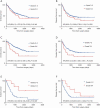Neoadjuvant chemotherapy-induced severe neutropenia is associated with histopathological response and survival in locally advanced gastric cancer
- PMID: 35117182
- PMCID: PMC8798434
- DOI: 10.21037/tcr.2019.12.68
Neoadjuvant chemotherapy-induced severe neutropenia is associated with histopathological response and survival in locally advanced gastric cancer
Abstract
Background: Neoadjuvant chemotherapy (NAC) has been shown to improve the prognosis for patients with locally advanced gastric cancer (LAGC). Neutropenia, a predominant chemotherapy-related adverse event, affects the therapeutic course for NAC.
Methods: Data for 233 patients with LAGC treated with NAC and curative gastrectomy at our center were retrospectively analysed in terms of the relationship between neutropenia and clinicopathological features or outcomes.
Results: NAC-induced neutropenia, NAC-induced severe (grade 3/4) neutropenia (NISN), and a favorable histopathological response (HPR) were observed in 102 (43.8%), 35 (15.0%), and 103 (44.2%) patients, respectively. Together with tumor differentiation, clinical response, and lymphovascular invasion (LVI), and NISN independently predicted a favorable HPR [odds ratio (OR) =4.158, 95% confidence interval (CI): 1.762-9.812, P=0.001). Among patients treated with postoperative chemotherapy, NISN independently predicted poor compliance with postoperative chemotherapy (OR 0.364, 95% CI: 0.148-0.894, P=0.028) and thus poor overall survival (OS) and disease-free survival (DFS). Among patients treated with preoperative chemotherapy alone, NISN was associated with a tendency towards a better DFS (P=0.116) and independently predicted superior OS (hazard ratio =0.253, 95% CI: 0.077-0.830, P=0.023).
Conclusions: In conclusion, our study revealed a link between NISN, HPR, treatment compliance, and survival. NISN is useful for guiding treatment strategies and predicting prognosis for LAGC patients.
Keywords: Neutropenia; gastric cancer; histopathological response (HPR); neoadjuvant chemotherapy (NAC); prognosis.
2020 Translational Cancer Research. All rights reserved.
Conflict of interest statement
Conflicts of Interest: All authors have completed the ICMJE uniform disclosure form (available at http://dx.doi.org/10.21037/tcr.2019.12.68). The authors have no conflicts of interest to declare.
Figures




References
-
- Xu X, Zheng G, Zhang T, et al. Is pathologic tumor regression grade after neo-adjuvant chemotherapy a promising prognostic indicator for patients with locally advanced gastric cancer? A cohort study evaluating tumor regression response. Cancer Chemother Pharmacol 2019;84:635-46. 10.1007/s00280-019-03893-4 - DOI - PubMed
LinkOut - more resources
Full Text Sources
